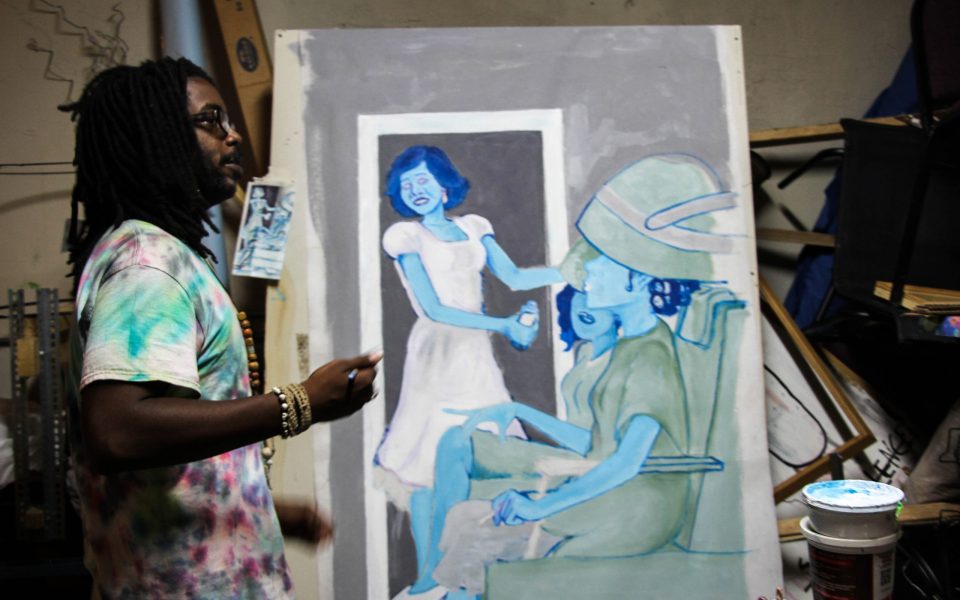Donell Williams plans to hang the panel on the door of an old hair salon, along with East Winston Art Up. (photo by Daniel Wirtheim)
by Daniel Wirtheim
When Donell Williams walked into Studios@625 five years ago, he was at a low point in his artistic career. The 17-year-old street artist was fed up with getting his tags sandblasted off walls and tired of his name only being remembered by police.
His father had been a graffiti artist in Brooklyn, where Williams learned to appreciate a well-made tag, and ever since grade school Williams wanted to master the art form.
He started out small, making illustrations that classmates would sometimes buy from him. He impressed his teachers and one substitute in particular, Marianne DiNapoli Mylet, invited him to help her paint a mural. And at 17, when he ducked into Studios@625, the studio that Mylet co-founded and manages in Winston-Salem, he found a mentor.
He learned the ropes mixing paint and working as an assistant for her. He was able to join a community of critics who helped him refine his craft while retaining the passion that he once executed under bridges and on stray walls. It was a challenge, because before becoming a part of the larger art community, the idea of holding exhibits was appealing, but Williams felt it was inaccessible.
“I just felt like I would go out and I would steal glimpses of this art world sometimes,” said Williams, “and then go back into my world and, you know, give glimpses.”
Through an organization that Mylet directed, !POWAR!, Williams was able to teach a class in splatter paint to kids who were in a similar position as he was in grade school.
“This one kid came into the program and he was into trouble and stuff and he was tagging,” Williams said. “And the more I investigated his tags and who he was tagging with, I realized he was tagging with the same exact group of people I was tagging with as a little kid — same people.”
Taggers carry a book around, Williams said, so they don’t lose ideas for a good tag they might come up with on the fly. Williams loaned the boy his own black book and when it was returned the pages were filled with impressive artwork.
“What I basically told him was that I used to do the same thing as him,” Williams said. “All I can say is that if you want to make a career out of this you don’t have to dedicate all of your time to being anonymous. You can land a wall that you can do in broad daylight with the police’s help.”
Williams is now a resident artist at Studio 7, a gallery ran by Marsha McNeely Hierl, who Williams met through Mylet. He’s currently working on projects with a local mural group called East Winston Art Up.
Although the studio is large, it’s not large enough to stop the space from being littered with canvases and sketches. It looks unorganized, but it’s where Williams goes to focus.
In one corner of his studio, a large, rectangular panel is painted with the outline of women sitting in a hair salon. It’s a work in progress but when he’s done the panel will be placed as a mural on the door of an old hair salon in East Winston. He hopes that the finished project will be used to commemorate what he considers as an important era of the community’s history.
“Women didn’t really have the option to get their own salon, especially black women,” Williams said, describing the 1940s. “So they were just doing it out of their kitchen.”
Along with East Winston Art Up, Williams has been collecting interviews with residents of the area so that they can use oral history as a guide for mural painting.
Williams plans on doing an image of Councilman Derwin Montgomery who represents Winston-Salem’s East Ward. The historic Safe Bus Company, brick maker George Black and the “5” Royales are other inspirations for planned murals. Williams believes the murals will inspire a younger generation to do more for the community.
“They were people that were born in a time when the world really wasn’t their oyster but they made it their oyster,” Williams said. “You have no obstacles compared to your grandparents and they really shook the town up.”
Join the First Amendment Society, a membership that goes directly to funding TCB‘s newsroom.
We believe that reporting can save the world.
The TCB First Amendment Society recognizes the vital role of a free, unfettered press with a bundling of local experiences designed to build community, and unique engagements with our newsroom that will help you understand, and shape, local journalism’s critical role in uplifting the people in our cities.
All revenue goes directly into the newsroom as reporters’ salaries and freelance commissions.


Leave a Reply